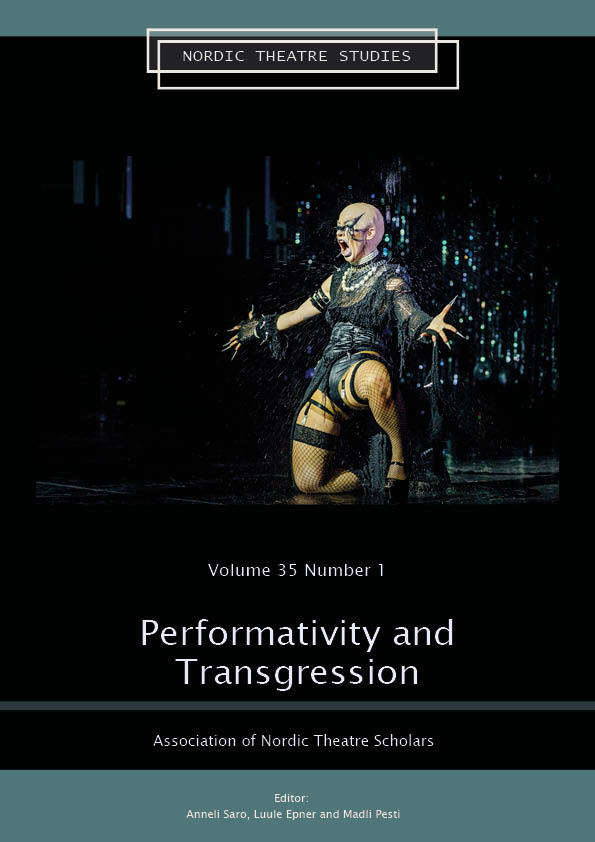Opera-film Baņuta
The Birth of a New Aesthetic Regime
DOI:
https://doi.org/10.7146/nts.v35i1.145375Keywords:
opera-film, Baņuta, Latvian opera, new aesthetic regime, deconstruction, transgression, interartAbstract
The opera-film Baņuta (2021) is a contemporary art project based on the Latvian national opera Baņuta (1920, music by Alfrēds Kalniņš, libretto by Artūrs Krūmiņš) that has not been staged since 1999. The film was made under the restrictions of Covid-19 that impeded the production of an interactive contemporary music theatre performance in presence. The project was implemented by an international team led by Latvian dramaturg Evarts Melnalksnis and German stage director Franziska Kronfoth.
In terms of approach to the source (score and libretto), content- and form-wise, the opera-film Baņuta is somewhat transgressive and offers a new aesthetic regime to a well-known example of so-called national classics. Using deconstruction strategies, the authors of the film replace representation with performativity, include the discourse of opera’s performing history and contexts in the film narrative, and thus extend the relevance of the following topics: women in war, violence, otherness, and similarity. They introduce the contemporaneity in a performative artistic language and aesthetics, at the same time questioning the relevance of the opera genre in the context of the performing arts today. The article attempts to illustrate the challenges of the researchers facing the interart phenomena based on a particular case.
References
Austin, John Langshow. 1975. How to do things with words. The William James Lectures delivered at Harvard University in 1955. New York: Oxford University Press. https://doi.org/10.1093/acprof:oso/9780198245537.003.0001.
Baņuta. Director: Franziska Kronfoth; Script: Evarts Melnalksnis, Camera: Toms Šķēle. Producer: Story Hub; Hauen & Stechen, Broadcaster: Riga IFF festival. 2021. 154’.
Baņuta. Film annotation. 2021. Riga International Film Festival 2021. https://rigaiff.lv/en/films-2021/banuta/ (28.1.2023).
Baņuta. 2021. Film screenshots (publicity images). Riga International Film Festival 2021.
Butler, Judith. 1988. “Performative Acts and Gender Constitution: An Essay in Phenomenology and Feminist Theory.” Theatre Journal 40:4, 519–31.
Citron, Marcia J. 2013. “Opera and Film”. In David Neumayer (ed.). The Oxford Handbook of Film Music Studies. Oxford: Oxford University Press, 44–71.
Fischer-Lichte, Erika. 2008. The Transformative Power of the Performance: A New Aesthetics. Translated by Saskya Iris Jain. London/New York: Routledge.
Fischer-Lichte, Erika. 2009. “Interart aesthetics.” A reader for the symposium Laboratory: Methods of Interart Studies. Freie Universität Berlin. 16-18.9.2009. https://www.geisteswissenschaften.fu-berlin.de/v/interart/media/dokumente/laboratory-reader/Text_Fischer-Lichte_Interart.pdf (15.1.2023).
Fischer-Lichte, Erika. 2016. “Introduction: From Comparative arts to interart studies.” Paragrana. Internationale Zeitschrift für Historische Anthropologie 25:2, 12–16.
Fūrmane, Lolita. 2000. “Opera. Četri vēstures loki teātrī.” In Latvijas Nacionalā opera. Rīga: Mantojums, 97–184.
Havelková, Tereza. 2017. Opera as hypermedium: meaning-making, immediacy and the politics of perception. PhD Thesis, Amsterdam School of Cultural Analysis (ASCA).
Klotiņš, Arnolds Laimonis. 2017. “Mīti un patiesība par Alfrēda Kalniņa operu Baņuta.” LSM.lv, 27.3.2017. https://klasika.lsm.lv/lv/raksts/100-latvijas-pirmizrades/miti-un-patiesiba-par-alfreda-kalnina-operu-banuta.a83894/ (7.2.2023).
Kudiņš, Jānis. 2019. “Baņuta, the first opera in Latvian and its libretto as a historical narrative in the context of staging history.” Culture Crossroads 14, 111–26.
Mellēna-Bartkeviča, Lauma. 2018. “Opera across borders: new technologies and mediatization.” Methis. Studia humaniora Estonia 21/22, 76–89.
Melnalksnis, Evarts. 2021. “Operfilma Baņuta. Pētniecībā balstīta mākslinieciskā interpretācija” (Opera-film Baņuta. Research-based artistic interpretation). Conference section “Mākslas un zinātnes sinerģija izglītībā un kultūrtelpā” (Synergy of art and science in the education and cultural space), Conference “Culture Crossroads” 2021, Latvian Academy of Culture, 2.11.2021.
Miķelsone, Anita. 2005. Latviešu mūzikas literatūras tēmas. Rīga: Musica Baltica. https://www.letonika.lv/groups/default.aspx?title=kanons38.jpg (7.2.2023).
Novak, Jelena. 2015. Postopera. Reinventing the Voice-Body. London/New York: Routledge.
Ostins, Džons Langšovs. 2011. Kā ar vārdiem darīt lietas. Translated by Jānis Nameisis Vējš. Rīga: Liepnieks & Rītups.
Raginskis, Edgars. 2021. “Mēs jums (ne)mācīsim mīlēt Baņutu.” Satori.lv, 16.10.2021. https://satori.lv/article/mes-jums-nemacisim-milet-banutu (7.2.2023).
Rancière, Jacques. 2011. Aisthesis. Scènes du régime esthétique de l’art. Paris: Galilée.
Rebstock, Matthias and David Roesner (eds.). 2012. Composed theatre. Aesthetics. Practices. Processes. Bristol, UK/Chicago, USA: Intellect.
Sadie, Stanley and John Tyrrell. 2021. “Music theatre/Musiktheater.” In Stanley Sadie and John Tyrrell (eds.). New Grove Dictionary of Music and Musicians. London, New York: MacMillan, 535–43.
Tanke, Joseph J. 2011. “What is the aesthetic regime?” Parrhesia 12, 71–81.
Downloads
Published
How to Cite
Issue
Section
License
The copyright belongs to the authors and Nordic Theatre Studies. Users can use, reuse and build upon the material published in the journal but only for non-commercial purposes. Users are allowed to link to the files, download the files, distribute the files on a local network (preferably by links), upload the files to local repositories if their institutions require them to do so, but not republish the files without proper agreements with the journal and the author.

